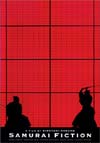Samurai Fiction
A film review by [skylie]

Samurai Fiction
A film review by [skylie]

The stark image gracing the case to the DVD brings to mind a noble and classic samurai tale within. Two silhouettes against a red and black background, simple white text below their feet merged to the floor. Flip the case over and discover that the films description also puts the same ideas into one's mind. Black and white images of men wielding swords, a fair maiden, and a story of a man having to retain his honour and a battle that will show whether he or his enemy is the better one. "This," it claims with seriousness drenched in its simple letter, "is Samurai Fiction."
So, just imagine my surprise when I started watching the film and realized that it wasn't a deep and serious drama filled with soul. Instead, what I had on my television screen was an uproarious and hilarious comedy filled with soul.
At first, the transition was a little awkward. The movie sets itself up well if you're sold that it's an action-drama, and some of the things meant to be humourous will come off as just poor film-making and bad scripting. But these feels do not stay for long, and soon you realize that this is meant to be something to laugh at, and laugh you will. The movie quickly slides from being possibly serious to obviously comedic, and it doesn't slow down until end credits begin to roll. The humour itself is fabulous; it's like watching a well-written anime, but as live-action instead of animation, which allows it to feel more real and appreciated.
Filmed in black and white with artistic red in the typical places, Masaki Kobayashi's Samurai Fiction takes a basic feudal Japan story line and turns it on its side. When villain Rannosuke manages to steal a precious heirloom from Heishiro Inukai's clan, Inukai is set on seeking his revenge and stealing it back. Through the course of his actions again Rannosuke, he finds himself in the care of a beautiful young girl and her father, a former government official and (of course) retired samurai. And, of course, love blossoms between Inukai and this girl. The story is very familiar, but it matters little because it is told so well. Not only is the humour top-notch (I have difficulty remembering when I laughed so hard watching a film), but the action is thrilling and the movie was done in a very beautifully, visually stunning way. It is unusually straightforward for most Japanese films; I couldn't help but wonder if it were really made here in America, by someone like Quinten Terantino, as it seemed far more in touch with that style. As far as performances go, our star could have been a little more shining and convincing, but what Mari Natsuki's Inukai lacks, Taketoshi Naitô's Rannosuke makes up for. Rannosuke is quite possibly one of the best villains I've seen. His charmingly ugly character makes you almost want to root for him, with elegance, grace, and deceitful, cunning motives.
Samurai Fiction is a truly unique gem, definitely a surprise for a reviewer who's used to picking up a Japanese or Chinese film that will send her into a serious, scary world filled with suspense and drama. The laughs that this film pulls out are accompanied by a deep breath of fresh, air.
Image copyright Media Blasters, Inc , 2002